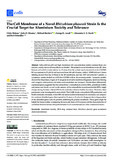| dc.description.abstract | Soils with low pH and high aluminium (Al) contamination restrict common bean production, mainly due to adverse effects on rhizobia. We isolated a novel rhizobium strain, B3, from Kenyan soil which is more tolerant to Al stress than the widely used commercial strain CIAT899. B3 was resistant to 50 µM Al and recovered from 100 µM Al stress, while CIAT899 did not. Calcein labeling showed that less Al binds to the B3 membranes and less ATP and mScarlet-1 protein, a cytoplasmic marker, leaked out of B3 than CIAT899 cells in Al-containing media. Expression profiles showed that the primary targets of Al are genes involved in membrane biogenesis, metal ions binding and transport, carbohydrate, and amino acid metabolism and transport. The identified differentially expressed genes suggested that the intracellular γ-aminobutyric acid (GABA), glutathione (GSH), and amino acid levels, as well as the amount of the extracellular exopolysaccharide (EPS), might change during Al stress. Altered EPS levels could also influence biofilm formation. Therefore, these parameters were investigated in more detail. The GABA levels, extracellular EPS production, and biofilm formation increased, while GSH and amino acid level decreased. In conclusion, our comparative analysis identified genes that respond to Al stress in R. phaseoli. It appears that a large portion of the identified genes code for proteins stabilizing the plasma membrane. These genes might be helpful for future studies investigating the molecular basis of Al tolerance and the characterization of candidate rhizobial isolates that perform better in Al-contaminated soils than commercial strains. | en_US |

